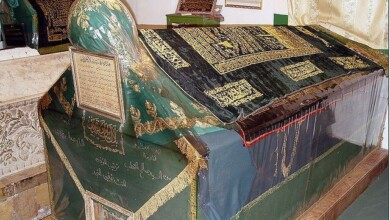Uthman ibn Affan: The Possessor of two lights
Uthman ibn Affan (RA), the esteemed companion of Prophet Muhammad (PBUH), was the son of Affan ibn Abi al-As ibn Umayya ibn Abd Shams al-Qurashi al-Umayyad. He was the Commander of the Faithful (Amir al-Mu’minin) and one of the bearers of glad tidings of paradise.
His lineage traces back to the Prophet – through the line of Abdul Manaf. He was born in the city of Taif six years after the Year of the Elephant.
Uthman had the Kunyah “Abu Amr” during the pre-Islamic era (Jahiliyyah). However, when his wife Ruqayyah, the daughter of the Prophet (RA) gave birth to a child, he was given the kunyah “Abu Abdullah; He was also famously known as “Dhul–Noorayn,” which means “The Possessor of Two Lights” because he married two daughters of the Prophet Muhammad: Ruqayyah and Umm Kulthum (RA).
The Islam of Uthman ibn Affan
Uthman ibn Affan was among the early converts to Islam from the companions, even before the Muslims began to gather at the house of Al-Arqam.
Abu Bakr Al-Siddiq (RA) invited him to Islam, and he took Uthman to meet the Prophet. Uthman embraced Islam after meeting the Prophet; at that time, he was over thirty years old.
The family of Uthman ibn Affan is among the most prominent families in early Islam. It was known for its social and economic status in Makkah, as well as its close lineage ties to the Prophet Muhammad.
His father, Affan ibn Abi al-As – was a well-known merchant and one of the noblemen of Quraysh. He died while Uthman was still young.
His mother, Arwa bint Kurayz ibn Rabi’ah was a daughter of Al-Bayda bint Abd al-Muttalib, the Prophet’s paternal aunt. Therefore, Arwa was the cousin of the Prophet Muhammad, and Uthman was the Prophet’s maternal cousin.
His wives
- Ruqayyah bint Rasul Allah – He married her before the migration, and she died after the Battle of Badr.
- Umm Kulthum bint Rasul Allah – He married her after Ruqayyah’s death, and this is why he was called “Dhul-Nurayn” (The Possessor of Two Lights).
He is the only man in history to have married two daughters of a prophet.
Physical and ethical characteristics of Uthman ibn Affan
Uthman ibn Affan was known for his handsome appearance and pleasing countenance. He was of medium height, neither tall nor short, but had a well-proportioned stature. He had a robust build and long arms, and his hands were covered with dense hair. Uthman had a long beard.
In terms of his character, Uthman was known for his extreme modesty and shyness. He was a generous and easy-going individual. He was beloved among his people both before and after accepting Islam. Uthman was a devout worshipper of Allah and lived a simple and ascetic life, showing little attachment to worldly possessions.
The actions of Uthman ibn Affan during the Prophetic era
Uthman ibn Affan undertook numerous significant actions in the service of Allah and His Messenger during the time of the Prophet, including:
- He was the first to migrate to Abyssinia (Habasha) along with his wife.
- Uthman prepared the army for the battle of Tabuk.
- He expanded the Prophet’s Mosque (Masjid al-Nabawi).
- Uthman purchased the well of Rumah and dedicated it as a charitable endowment (waqf) for the Muslims.
Military campaigns of Uthman ibn Affan
Uthman ibn Affan (may Allah be pleased with him) participated in all the military battles led by the Prophet Muhammad except for the Battle of Badr. This was because the Prophet instructed him to stay behind to take care of his daughter Ruqayyah, who was ill at the time. The military campaigns in which Uthman participated include:
- The Battle of Uhud.
- The Campaign of Ghatafan (Dhi Amr).
- The Campaign of Dhat al-Riqa.
- The Expedition of Tabuk, during which he prepared the army of Al-Asrah (the needy).
The Caliphate of Uthman ibn Affan
Uthman ibn Affan assumed the caliphate after the death of the Caliph Umar ibn al-Khattab (RA) three days later. People gathered with the esteemed companion Abdul-Rahman ibn Awf to consult on who should rightfully be the Caliph. All the companions were unanimous in choosing Uthman ibn Affan.
His caliphate was initiated in the 24th year of the Hijrah, and he was elected as Caliph by the consensus of the companions. In this position, he became the third of the rightly guided Caliphs. His caliphate lasted for twelve years and was marked by numerous achievements, including:
- He meticulously cared for the Quran, copying it into several manuscripts and sending them to various regions.
- His attention to mosques, including the expansion of the Haram Mosque in Makkah and the Prophet’s Mosque in Madina.
- Establishment of the first naval fleet for the Muslims.
- Conquests of various lands, including Armenia, Cyprus, Tripoli, and parts of Africa.
The martyrdom of Uthman ibn Affan
Uthman ibn Affan was tragically assassinated by a group of rebels who stormed his home. At the time, he was fasting and reciting the Quran, which was still in his hands when he was killed.
He died as a martyr (shaheed) in the 35th year of the Hijrah and was laid to rest in Al–Baqi cemetery.


